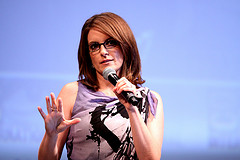Share This Article:
Return to Silver Screen Central Home page


Tina Fey plays it somewhat serious in Whiskey Tango Foxtrot
C+Imagine that Liz Lemon, Tina Fey‘s character in the TV comedy series 30 Rock, had been sent to Afghanistan a decade ago to cover the war there. The results would probably look like Whiskey Tango Foxtrot, a movie that has a number of entertaining scenes but never quite coalesces as a dramatic whole.
Fey plays Kim Baker, a cable news journalist who tries to jumpstart a stalled career by taking an assignment in Afghanistan. She soon grows to love the mix of danger, sex, and partying that forms the lifestyle of foreign journalists. Eventually, she becomes more serious about a news photographer (Martin Freeman), a relationship that may end when her assignment eventually does.
Whiskey Tango Foxtrot is based on a memoir by Chicago Tribune journalist Kim Barker about her own experiences in Afghanistan. The film consists primarily of various anecdotal scenes featuring Kim with a variety of colorful characters, including an experienced Australian journalist (Margot Robbie) who shows her the ropes, a Marine general (Billy Bob Thornton) with a dim view of journalists in general, and a lecherous local politician (Alfred Molina). Many of these scenes, taken directly from the book, work quite well, especially the relationship between Kim and the general, who grudgingly comes to accept her. Whiskey Tango Foxtrot also paints a bizarre but fascinating picture of journalists partying like there’s no tomorrow in buildings that are oases of booze, rock music, and sex in the midst of a highly dangerous war zone lying just outside the exit door. Despite this often compelling imagery and a solid dramatic performance by Fey, however, Kim never feels like a real character. Instead, she’s a plot device whose character development is shown by montages of her partying in night clubs as the months go by. Whiskey Tango Foxtrot aims for emotional depth in a closing stateside encounter between Kim and a now crippled soldier she interviewed in Afghanistan, but the scene feels curiously flat. As a black comic depiction of the outlandish realities of modern warfare, Whiskey Tango Foxtrot succeeds, but as the story of an actual journalist, it ultimately misses the target.
Continue reading on Whiskey Tango Foxtrot: Mini-review




Recent Comments